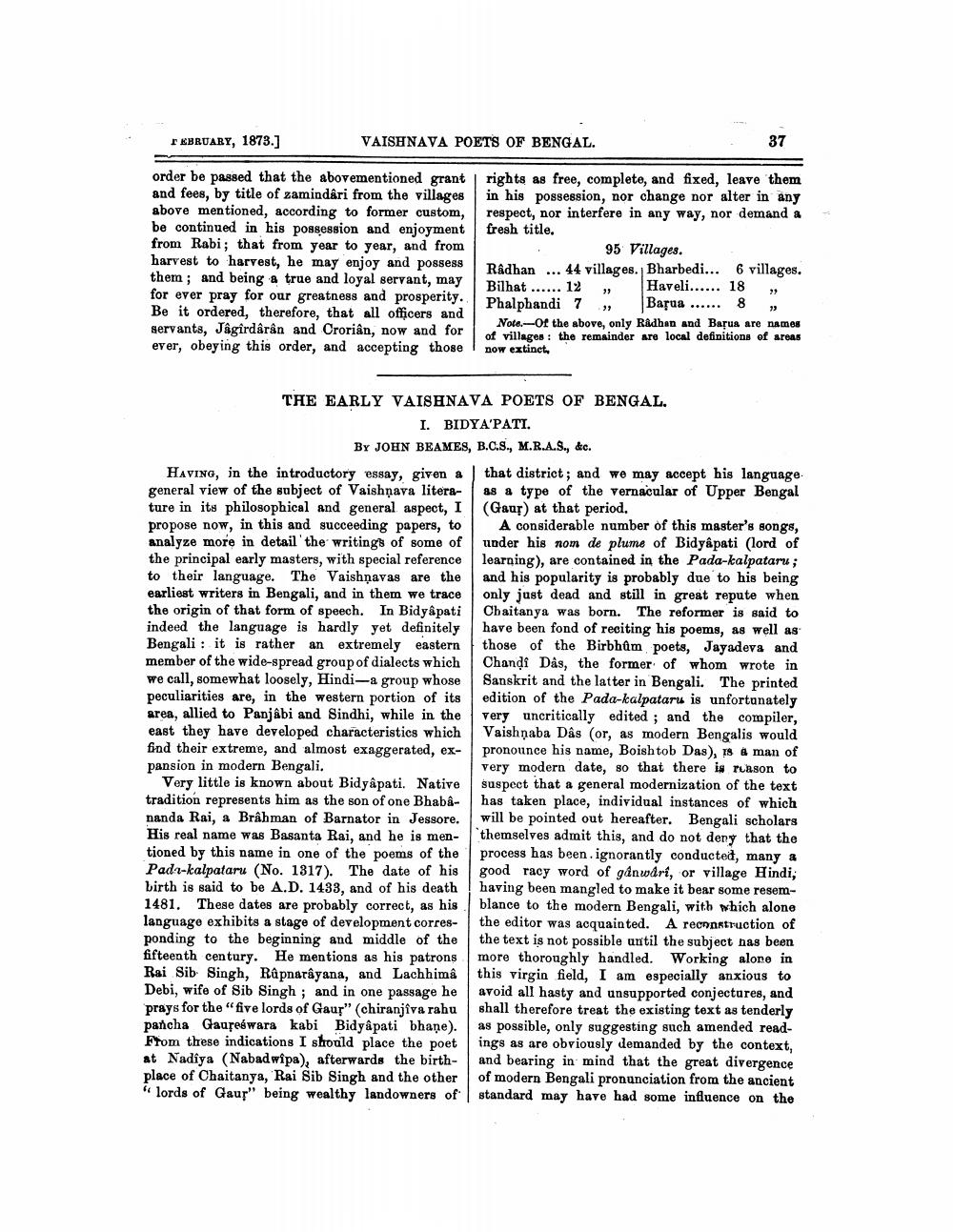________________
FEBRUARY, 1873.]
order be passed that the abovementioned grant and fees, by title of zamindâri from the villages above mentioned, according to former custom, be continued in his possession and enjoyment from Rabi; that from year to year, and from harvest to harvest, he may enjoy and possess them; and being a true and loyal servant, may for ever pray for our greatness and prosperity.. Be it ordered, therefore, that all officers and servants, Jâgirdârân and Croriân, now and for ever, obeying this order, and accepting those
VAISHNAVA POETS OF BENGAL.
HAVING, in the introductory essay, given a general view of the subject of Vaishnava literature in its philosophical and general aspect, I propose now, in this and succeeding papers, to analyze more in detail the writings of some of the principal early masters, with special reference to their language. The Vaishnavas are the earliest writers in Bengali, and in them we trace the origin of that form of speech. In Bidyapati indeed the language is hardly yet definitely Bengali: it is rather an extremely eastern member of the wide-spread group of dialects which we call, somewhat loosely, Hindi-a group whose peculiarities are, in the western portion of its area, allied to Panjâbi and Sindhi, while in the east they have developed characteristics which find their extreme, and almost exaggerated, expansion in modern Bengali.
Very little is known about Bidyâpati. Native tradition represents him as the son of one Bhabânanda Rai, a Brâhman of Barnator in Jessore. His real name was Basanta Rai, and he is mentioned by this name in one of the poems of the Pada-kalpataru (No. 1817). The date of his birth is said to be A.D. 1433, and of his death 1481. These dates are probably correct, as his language exhibits a stage of development corresponding to the beginning and middle of the fifteenth century. He mentions as his patrons Rai Sib Singh, Râpnarayana, and Lachhimâ Debi, wife of Sib Singh; and in one passage he prays for the "five lords of Gaur" (chiranjiva rahu pancha Gaureéwara kabi Bidyapati bhane). From these indications I should place the poet at Nadiya (Nabadwipa), afterwards the birthplace of Chaitanya, Rai Sib Singh and the other "lords of Gaur" being wealthy landowners of
37
rights as free, complete, and fixed, leave them in his possession, nor change nor alter in any respect, nor interfere in any way, nor demand a fresh title.
THE EARLY VAISHNAVA POETS OF BENGAL.
I.
BIDYA'PATI.
BY JOHN BEAMES, B.C.S., M.R.A.S., &c.
95 Villages.
Râdhan... 44 villages. Bharbedi... 6 villages. Bilhat .... 12" Haveli...... 18 Phalphandi 7
"
......
Barua..... 8 73
Note. Of the above, only Râdhan and Barua are names of villages: the remainder are local definitions of areas now extinct.
that district; and we may accept his language. as a type of the vernacular of Upper Bengal (Gaur) at that period.
A considerable number of this master's songs, under his nom de plume of Bidyapati (lord of learning), are contained in the Pada-kalpataru ; and his popularity is probably due to his being only just dead and still in great repute when Chaitanya was born. The reformer is said to have been fond of reciting his poems, as well as those of the Birbhum poets, Jayadeva and Chandi Dâs, the former of whom wrote in Sanskrit and the latter in Bengali. The printed edition of the Pada-kalpataru is unfortunately very uncritically edited; and the compiler, Vaishnaba Dâs (or, as modern Bengalis would pronounce his name, Boishtob Das), is a man of very modern date, so that there is reason to suspect that a general modernization of the text has taken place, individual instances of which will be pointed out hereafter. Bengali scholars themselves admit this, and do not deny that the process has been. ignorantly conducted, many a good racy word of ganwari, or village Hindi, having been mangled to make it bear some resemblance to the modern Bengali, with which alone the editor was acquainted. A reconstruction of the text is not possible until the subject has been more thoroughly handled. Working alone in this virgin field, I am especially anxious to avoid all hasty and unsupported conjectures, and shall therefore treat the existing text as tenderly as possible, only suggesting such amended readings as are obviously demanded by the context, and bearing in mind that the great divergence of modern Bengali pronunciation from the ancient standard may have had some influence on the




